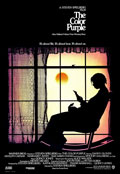
Directed by
Steven Spielberg
154 minutes
Rated M
Reviewed by
Bernard Hemingway

The Color Purple
Made four years before Spike Lee’s, Do The Right Thing, Steven Spielberg's adaptation of Alice Walker's Pulitzer Prize novel of the same name is a picture-book view of early 20th century Southern black culture that only a well-meaning white Jewish nerd, or someone similar, could make. Scripted by Menno Meyjes after Walker rejected her own draft, starting in 1909, it tells the story of Celie Johnson (a career coup for Whoopi Goldberg who had only been in an art film, Citizen, prior to this and who would not come cose to do anything as good again) a poor, ugly black girl living on farm in Georgia who has two children by her own father before being given by him in marriage to Albert (Danny Glover) a bully who abuses her unremittingly. We then follow Celie’s life across the years ending in the late 1930s.
I can’t recall Walker’s 1983 novel, which I read at the time, so how much of it has been altered I cannot say but what is so odd about Spielberg’s film is that while it offers a vision of what is effectively an all-black culture (there is only one scene involving a signficant number of whites) it is so indebted to Hollywood stereotypes of the Negro that it actually manages to be a “white” movie. Which is to say Speilberg's film is a typically sentimental story of underdog triumph (including a bizarre Blues Brothers style gospel redemption scene which segues into a cloying Out Of Africa ending). The Color Purple is an overblown melodrama in the Gone With The Wind manner only that the main character is Hattie McDaniels' Mammy rather than Scarlett O’Hara.
Aside from Spielberg’s proclivity for stereotypical portraiture the performances are fine with Goldberg engaging our sympathies as Celie and Glover doing quite the reverse as her oppressor, Oprah Winfrey, then a long way from her talk show fame, adequate as the big mamma, Sofia, and Margaret Avery in winning form as the juke-joint jezebel, Shug. Technically the film is top drawer but that is partly its problem - its all too polished and picturesque to have any sense of reality, and by the half-way mark our appetite for Spielberg’s style of sanitized social drama is pretty much satiated. The film was comprehensively snubbed at the Oscars, not winning one of its eleven nominations. Why this happened I do not know, as Spielberg was quite the Hollywood golden boy, but the film went on to be a box office hit, although whether because of black or white audiences I cannot say. I will say, however, thank heavens for Spike Lee!
Want something different?





